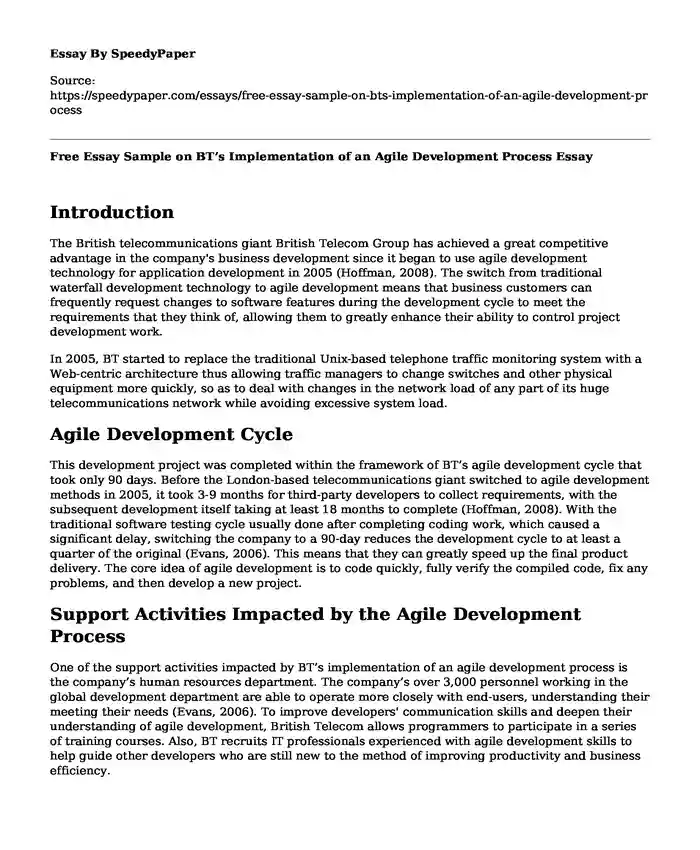
| Type of paper: | Essay |
| Categories: | Information technologies Software World |
| Pages: | 3 |
| Wordcount: | 678 words |
Introduction
The British telecommunications giant British Telecom Group has achieved a great competitive advantage in the company's business development since it began to use agile development technology for application development in 2005 (Hoffman, 2008). The switch from traditional waterfall development technology to agile development means that business customers can frequently request changes to software features during the development cycle to meet the requirements that they think of, allowing them to greatly enhance their ability to control project development work.
In 2005, BT started to replace the traditional Unix-based telephone traffic monitoring system with a Web-centric architecture thus allowing traffic managers to change switches and other physical equipment more quickly, so as to deal with changes in the network load of any part of its huge telecommunications network while avoiding excessive system load.
Agile Development Cycle
This development project was completed within the framework of BT’s agile development cycle that took only 90 days. Before the London-based telecommunications giant switched to agile development methods in 2005, it took 3-9 months for third-party developers to collect requirements, with the subsequent development itself taking at least 18 months to complete (Hoffman, 2008). With the traditional software testing cycle usually done after completing coding work, which caused a significant delay, switching the company to a 90-day reduces the development cycle to at least a quarter of the original (Evans, 2006). This means that they can greatly speed up the final product delivery. The core idea of agile development is to code quickly, fully verify the compiled code, fix any problems, and then develop a new project.
Support Activities Impacted by the Agile Development Process
One of the support activities impacted by BT’s implementation of an agile development process is the company’s human resources department. The company’s over 3,000 personnel working in the global development department are able to operate more closely with end-users, understanding their meeting their needs (Evans, 2006). To improve developers' communication skills and deepen their understanding of agile development, British Telecom allows programmers to participate in a series of training courses. Also, BT recruits IT professionals experienced with agile development skills to help guide other developers who are still new to the method of improving productivity and business efficiency.
Another support activity impacted by BT’s implementation of an agile development process is technology development. The traditional waterfall model failed to enable the company’s software projects to develop high-quality products within agreed schedules. The main reasons for the problem included poor demand management, too many requirements being met in a short time, and many requirements have nothing to do with specific customer needs, especially since the designer must deliver according to the original schedule. Because the software design is flawed, the coding is hasty, and the quality is poor. Developers will realize that bad software design will lead to bad code, but it must be delivered in accordance with the agreed timetable. The result was bad errors being noticed while integrating the software, at which point the basic business specifications have been changed wrongfully. Agile development allows to identify errors in the initial stages and eliminate waste in software development (Rasmusson, 2015).
Conclusion
The main advantage of BT's switch to agile development is that developers can always communicate with customers so that more time can be spent on the development of the required system features Instead of adding customer needs to software development like the waterfall development method, this approach requires testing the system with the end-user so that changes can be made to suit the customer’s preferences before completion. Although British Telecom is not measuring how many software defects can be reduced by the agile development method compared with the waterfall development method, the company started to track the shortening of the development cycle time and the "right-first-time" measurement.
References
Rasmusson, J. (2015). What is Agile? http://www.agilenutshell.com/http://www.infoworld.com/article/2650760/application-development/bt--a-case-study-in-agile-programming.html
Evans, I. (2006). Agile Delivery at British Telecom. Methods and Tools, 14(2), 20-27. http://www.methodsandtools.com/PDF/mt200602.pdf
Hoffman, T. (2008, March 11). BT: A case study in agile programming.
Cite this page
Free Essay Sample on BT's Implementation of an Agile Development Process. (2023, Oct 28). Retrieved from https://speedypaper.com/essays/free-essay-sample-on-bts-implementation-of-an-agile-development-process
Request Removal
If you are the original author of this essay and no longer wish to have it published on the SpeedyPaper website, please click below to request its removal:
- Paper Example: Critical Assessment of the Existent QOS Technologies
- Essay Sample on Emerging Technological Trend
- Comparison of the Changes Between the Kaluli and Azande Cultures. Paper Sample
- Free Essay Example: For Admission Committee
- Essay Sample on Secure Application Development Procedure
- Essay Sample on Crisis of Liberal Democracy in Europe
- 20th Century Tech: Revolutionizing Life with the Personal Computer - Essay Sample
Popular categories




